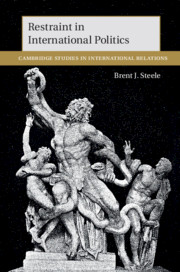Crossref Citations
This Book has been
cited by the following publications. This list is generated based on data provided by Crossref.
McIntosh, Christopher
2020.
The Trump administration’s politics of time: The temporal dynamics that enable Trump’s interests to determine American foreign policy.
Time & Society,
Vol. 29,
Issue. 2,
p.
362.
Haugevik, Kristin
and
Neumann, Cecilie Basberg
2021.
Reputation crisis management and the state: Theorising containment as diplomatic mode.
European Journal of International Relations,
Vol. 27,
Issue. 3,
p.
708.
Peys, Christopher
2021.
On the global politics of “decency” and “restraint”.
Journal of International Political Theory,
Vol. 17,
Issue. 3,
p.
553.
Rohde, Christoph J.
2021.
Reinhold Niebuhr and the Ongoing Relevance of his Christian Realism.
Zeitschrift für Außen- und Sicherheitspolitik,
Vol. 14,
Issue. 3,
p.
321.
Kustermans, Jorg
Sauer, Tom
and
Segaert, Barbara
2021.
A Requiem for Peacebuilding?.
p.
1.
Steele, Brent J
2021.
‘The cruelty of righteous people’: Niebuhr on the urgency of cruelty.
Journal of International Political Theory,
Vol. 17,
Issue. 2,
p.
203.
McDonald, Matt
2022.
Geoengineering, climate change and ecological security.
Environmental Politics,
p.
1.
Hartnett, Liane
Glanville, Luke
O'Driscoll, Cian
Wilcox, Lauren
Bellamy, Alexander
and
Steele, Brent
2022.
Winning? The Politics of Victory in an Era of Endless War.
International Studies Review,
Vol. 24,
Issue. 1,
Rohde, Christoph
2022.
Die potenziellen geopolitischen Folgen des Ukraine-Krieges.
Zeitschrift für Außen- und Sicherheitspolitik,
Vol. 15,
Issue. 2-3,
p.
201.
Levine, Daniel J
2022.
“He Knew of a Surety”: Realism, Zionist National-Security Discourse, and the Absent Sublime.
Global Studies Quarterly,
Vol. 2,
Issue. 3,
2022.
Uncertainty and Its Discontents.
p.
365.
Everett, Judas
2023.
The contradictory behaviour of Russia in response to the 2014 Ukrainian revolution.
New Perspectives,
Vol. 31,
Issue. 3,
p.
179.
Abramson, Yehonatan
and
Baram, Gil
2024.
Saving face in the cyberspace: Responses to public cyber intrusions in the Gulf.
Contemporary Security Policy,
Vol. 45,
Issue. 2,
p.
210.
Edelman, R David
2024.
Rethinking Cyber Warfare.
Hartnett, Liane
2024.
How love orders: an engagement with disciplinary International Relations.
European Journal of International Relations,
Vol. 30,
Issue. 1,
p.
203.





